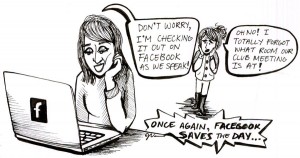Facebook has become an integral part of life
For millions of college students, Facebook has become a fact of life — it is a vast source of social stimulation that showcases the glamorous and interesting aspects of our everyday lives.
So quitting Facebook is easier said than done, especially since much of our generation’s social, and even professional, interactions now depend on web-based content. Facebook will be here to stay for a while, and rightfully so.
Although Facebook has many beneficial aspects like easy access to upcoming social events and increased contact with old friends, it also forces people to fixate and obsess over their digital image.
Many college students utilize Facebook to portray themselves as they want others to see them.
People list eclectic music tastes, post photographs from nights in Hollywood and quote their favorite authors to build a digital persona that will portray a favorable image to their fraternity brothers or sorority sisters, professional contacts and even parents.
Facebook is a mixture of people presenting a brand of themselves to other people and observing what others are doing without actually engaging with them in the real world.
In other words, people go to parties and take cool pictures that they post on Facebook to build a digital “brand” instead of creating interpersonal relationships in the real social sphere.
Stephanie Pushaw, a sophomore majoring in creative writing, argues that Facebook takes away from the day-to-day interactions with peers.
“People in social situations are often more invested in taking pictures to create the Facebook persona to show that they had a good time, rather than existing in the moment,” Pushaw said.
Facebook conveys the idea that we are always going out with friends and having fun.These false perceptions won’t necessarily make us happy.The reality is that most of us spend many of our hours alone, either by choice or because we have to finish our work.
“Facebook presents other people at the highlights of their lives, which implies that it is the only way that they live,” Pushaw said.
So the question is, if Facebook makes people unhappy, why do they continue to use it?
For Pushaw, it’s the desire to see what her friends are doing and keep track of social events.
“It would be harder, but not impossible, to have a social life without Facebook,” Pushaw acknowledged.
So I tried it out. Pushaw and I both quit Facebook.
Pushaw quickly realized that she was unable to look at event dates, couldn’t send electronic messages and had nowhere to upload her photos. She was back on Facebook within the hour.
I am currently still off Facebook, but the desire to rejoin is ever present.
The bottom line is that Facebook is necessary to live in our current society — it is the tool we use to make our lives more efficient.
Despite the arguments against its negative impact on our generation, Facebook is a tool that will continue to define the way we interact with our peers, judge our rivals and identify ourselves in an increasingly digital world.
As Pushaw says, “I wish I weren’t so dependent on Facebook, but I don’t see myself getting rid of it anytime soon.”
Aron Theising is a sophomore majoring in economics.

